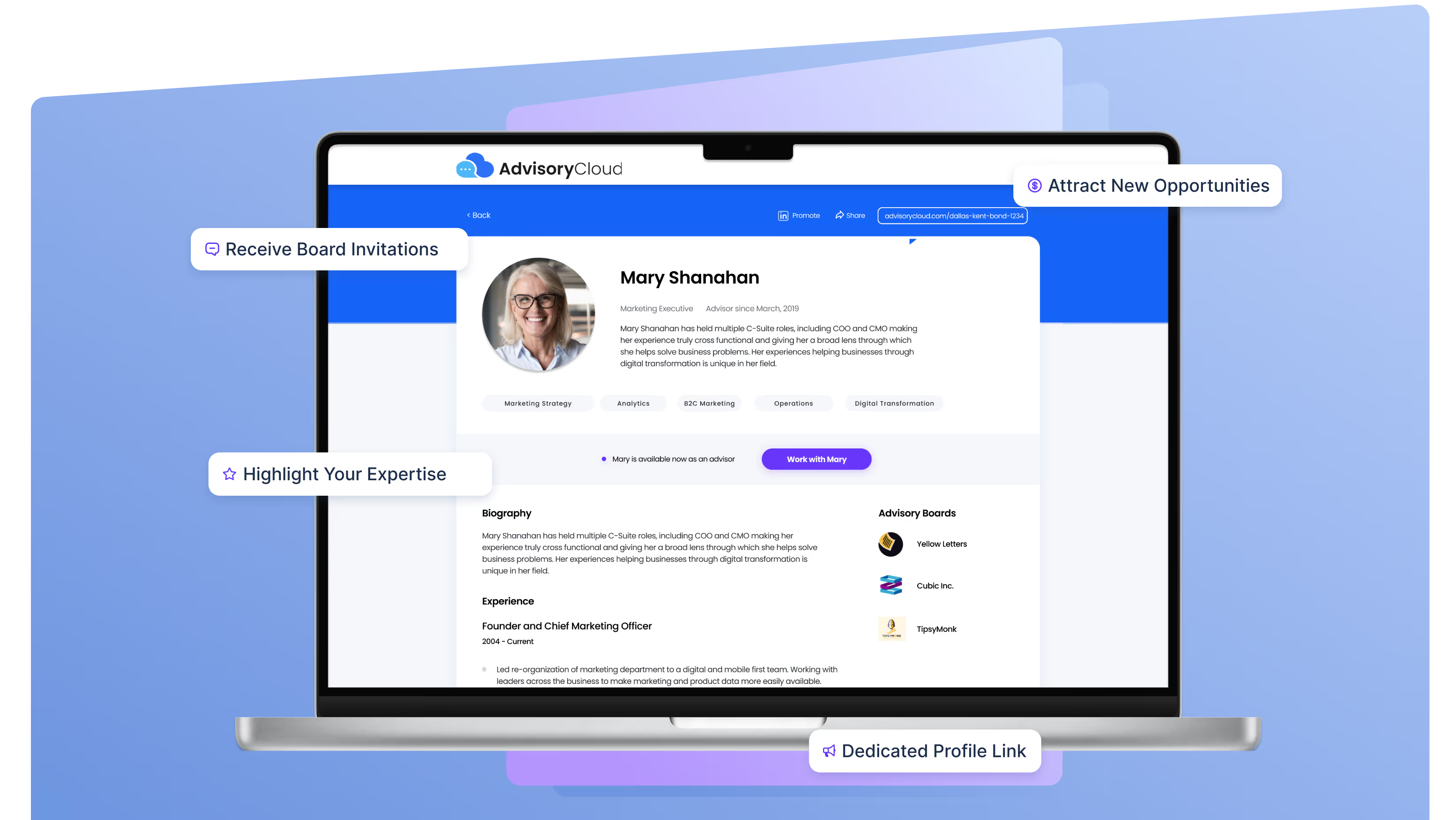August 25, 2023

Becoming a board member is a prestigious role that comes with a great deal of responsibility and influence. It is a position that allows individuals to contribute to important decision-making processes and make a meaningful impact.
If you are interested in pursuing a board position, this comprehensive guide will provide you with a step-by-step roadmap to achieve your goal. In this article, we will discuss what it means to be a board member, the various types of boards, the qualities and skills required, and the steps you can take to secure a board position.
Understanding the Role of a Board Member
A board member is a crucial figure in an organization's governance structure. They are responsible for setting strategic objectives, providing oversight, and ensuring the organization operates in accordance with its mission and values. Boards of Directors and their members also have fiduciary duties, meaning they must act in the best interest of the organization and its stakeholders. Understanding the scope of this role is essential before embarking on the journey to become a board member.
One important aspect of a board member's role is their responsibility to ensure transparency and accountability within the organization. This includes regularly reviewing financial statements, monitoring compliance with laws and regulations, and conducting audits or investigations when necessary. By maintaining a high level of transparency, board members help build trust with stakeholders and demonstrate their commitment to ethical practices.
Additionally, board members play a crucial role in strategic planning and decision-making. They are responsible for evaluating the organization's current performance, identifying areas for improvement, and developing long-term goals and strategies. This requires a deep understanding of the organization's industry, market trends, and competitive landscape. Board members must effectively communicate and collaborate with other board members, executives, and stakeholders. This is crucial to ensure the successful implementation of strategic plans.
Why Becoming a Board Member is a Worthwhile Pursuit
Becoming a board member offers numerous benefits and rewards. It allows you to contribute your expertise and experience to a cause or organization you are passionate about. Board membership also provides opportunities for personal growth, networking, and professional development. Moreover, it can be a fulfilling way to give back to your community and make a positive difference in society.
Additionally, serving as a board member can enhance your leadership skills and decision-making abilities. Being on a board means working with others, understanding difficult problems, and making important choices that can affect the organization's future. This experience can strengthen your ability to lead and manage teams effectively in various professional settings.
Exploring the Different Types of Boards
Before you try to join a board, it's important to know the different types of boards. Boards can be in different areas like companies, charities, government, and schools. Each board has its own way of working and goals. Understanding these differences will help you find the board that suits you best and where you can make a big difference.
Corporate boards are typically composed of executives and professionals who oversee the management and strategic direction of a company. They are responsible for making important decisions that impact the organization's financial performance and long-term goals. Corporate boards often focus on maximizing shareholder value and ensuring the company's profitability.
Non-profit boards, on the other hand, are comprised of individuals who are passionate about a specific cause or mission. These boards are responsible for guiding and supporting non-profit organizations in achieving their goals. Non-profit boards often focus on fundraising, community outreach, and ensuring the organization's resources are used effectively to fulfill its mission.
The Qualities and Skills Required to be an Effective Board Member
Being an effective board member requires a specific set of qualities and skills. These include strong leadership abilities, strategic thinking, financial acumen, ethical judgment, and the ability to collaborate and communicate effectively. Understanding and developing these qualities and skills will help you stand out as a qualified candidate during the board selection process.
Another important quality for an effective board member is the ability to think critically and make informed decisions. Board members must analyze complex information, evaluate options, and make decisions that align with the organization's goals and values. Being able to think critically and make sound judgments is crucial for the success of the board and the organization it serves.
In addition, board members should possess a strong sense of integrity and a commitment to ethical behavior. They must act in the best interest of the organization and its stakeholders, making decisions that are fair, transparent, and in compliance with legal and ethical standards. Maintaining strong ethics builds trust, credibility, and secures the organization's long-term sustainability and success.
Steps to Take Before Pursuing a Board Position
Before diving into the process of securing a board position, there are several steps you should consider taking. Firstly, assess your motivations and goals for seeking a board role.
Research the time commitment and level of responsibility required. It is also important to evaluate your expertise and identify areas where you can add value as a board member. Additionally, consider seeking relevant training or certifications to enhance your qualifications.
Furthermore, networking and building connections within the industry can greatly increase your chances of securing a board position. Attend industry conferences, join professional organizations, and engage in conversations with current board members to expand your network. Building relationships with influential individuals can provide valuable insights and recommendations for potential board opportunities.
Researching and Identifying Potential Board Opportunities
Once you have a clear understanding of the type of board you are interested in, it is time to research and identify potential board opportunities. This involves exploring organizations, their missions, and their current board members. Look for alignment between your interests and the goals of the organizations you are considering. Network and seek recommendations from professionals already involved in the board or relevant industry.
Additionally, it can be helpful to attend industry conferences, seminars, and workshops to expand your network and gain insights into potential board opportunities. These events often attract professionals who are actively involved in board service and can provide valuable information and connections. Also, think about joining professional groups or organizations in your area of interest. They might have helpful resources and chances to connect with others who are interested in board positions.
How to Network and Connect with Existing Board Members
Networking plays a crucial role in securing a board position. Take the time to attend industry events, join professional associations, and connect with experienced board members. Leverage your existing network and seek introductions to individuals who are currently serving on boards. This will not only enhance your chances of being considered for a board position but also provide valuable insights into the realities of being a board member.
To connect with board members, join online communities and forums focused on board governance and actively engage with them. These platforms provide a space for board members to share their experiences, discuss industry trends, and offer advice to aspiring board members. By engaging in these online discussions, you can establish connections with board members and gain valuable knowledge about the board recruitment process.
In addition to attending industry events and joining professional associations, consider volunteering for nonprofit organizations or community initiatives that align with your interests and values. Many board members are actively involved in these organizations and serving alongside them can provide opportunities to build relationships and showcase your skills and dedication. Volunteering can also demonstrate your commitment to making a positive impact and give you firsthand experience in board governance.
Preparing your Application for a Board Position
When applying for a board position, it is essential to prepare a compelling application that highlights your qualifications and experiences. Tailor your resume and cover letter to emphasize your relevant skills and demonstrate your passion for the organization's mission. Be sure to highlight any previous board or leadership roles, as well as any specific expertise or accomplishments that make you a strong candidate.
Crafting an Impressive Board Member Resume/CV
Your board member resume or CV should be well-organized and concise, yet comprehensive. Include your relevant professional experience, educational background, board affiliations, and any honors or awards you have received. Highlight your leadership skills, strategic thinking abilities, and track record of success. It is important to demonstrate your commitment to ethics, integrity, and fiduciary responsibilities.
Navigating the Interview Process for a Board Position
Securing an interview for a board position is a significant milestone. The interview process allows you to showcase your qualifications and fit for the board. Prepare for the interview by researching the organization, understanding its challenges and goals, and formulating thoughtful questions. Be prepared to articulate your vision for the organization and demonstrate how you can contribute to its success.
Understanding the Importance of References and Recommendations for Board Appointments
References and recommendations play a crucial role in the board appointment process. Reach out to individuals who can speak to your qualifications, character, and professional accomplishments. These references should be respected professionals who can vouch for your abilities and suitability as a board member. Cultivate relationships with individuals who can provide strong recommendations and support your pursuit of a board position.
How to Leverage your Professional Experience in Board Applications
Your professional experience is a valuable asset when applying for a board position. Highlight your accomplishments, particularly those that align with the organization's goals and challenges. Emphasize relevant leadership roles, financial expertise, strategic planning abilities, and any experience with governance and regulatory oversight. Clearly convey how your professional background will add value to the board and contribute to the organization's success.
Tips for Demonstrating Leadership Potential in Board Interviews
Demonstrating leadership potential is crucial during board interviews. Showcase your ability to inspire and motivate others, make effective decisions, and navigate complex challenges. Discuss instances where you have successfully led teams or projects, resolved conflicts, and delivered results. Emphasize your commitment to continuous learning and professional development as a leader and your dedication to serving as a positive role model within the organization.
Understanding the Legal and Ethical Responsibilities of a Board Member
Board members have legal and ethical responsibilities that must be upheld. Familiarize yourself with the laws and regulations governing the organization and its industry.
Understand your duty of care, duty of loyalty, and duty of obedience. Comply with legal and ethical standards, maintain confidentiality, and avoid conflicts of interest. Act in the best interest of the organization and its stakeholders.
Best Practices for Contributing as a New Board Member
Once appointed as a board member, there are best practices to follow to contribute effectively. Quickly familiarize yourself with the organization's governance structure, strategic plan, and key stakeholders.
Listen actively and learn from experienced board members. Engage in open and transparent communication, actively participate in board meetings, and make informed decisions. Continuously educate yourself on industry trends, regulations, and best practices to bring fresh insights and perspectives to the board.
Building Relationships and Collaborating with Fellow Board Members
Building positive relationships and fostering collaboration with fellow board members is essential for effective governance. Respect differing opinions, encourage open dialogue, and leverage the diverse perspectives and expertise of fellow board members. Foster a culture of respect, trust, and inclusivity within the boardroom. Collaborate on board initiatives, work towards common goals, and ensure decisions are made collectively, in the best interest of the organization.
Strategies for Effective Communication within the Boardroom
Effective communication is vital in the boardroom. Clearly and concisely convey your thoughts and ideas. Active listening is equally important, as it demonstrates respect for other board members and their perspectives.
Seek opportunities to improve communication within the board, such as implementing structured meeting agendas, ensuring equitable participation, and promoting a culture of transparency and accountability. Foster an environment where all board members feel comfortable sharing their opinions.
How to Navigate Conflicts of Interest as a Board Member
Conflicts of interest can arise when serving as a board member. It is important to recognize and properly manage these conflicts.
Familiarize yourself with the organization's conflict of interest policies and procedures. Disclose any potential conflicts and recuse yourself from discussions and decisions where a conflict exists. Make decisions based on what is in the best interest of the organization, without any personal gain or bias.
Understanding Financial Oversight and Responsibility as a Board Member
Financial oversight and responsibility are integral aspects of being a board member. Develop a strong understanding of the organization's financial statements, budgets, and financial performance indicators.
Ensure financial transparency and integrity by implementing robust financial controls and risk management practices. Regularly review financial reports, ask pertinent questions, and seek clarification when necessary. Act prudently and responsibly in managing the organization's financial resources.
The Importance of Continuous Learning and Development for Board Members
Continuously investing in your learning and development is crucial for success as a board member. Stay abreast of industry trends, emerging governance practices, and regulatory changes. Attend relevant training programs, workshops, and seminars.
Engage in professional networks and associations to stay connected with fellow board members. Seek feedback and evaluate your performance as a board member. Embrace a growth mindset and be open to new ideas and perspectives.
How to Assess and Mitigate Risks as a Responsible Board Member
Assessing and mitigating risks is an essential responsibility of board members. Develop a comprehensive understanding of the organization's risk profile and implement effective risk management processes. Regularly review risk reports, engage with management on risk mitigation strategies, and ensure adequate insurance coverage. Maintain a proactive approach to risk assessment and regularly evaluate the effectiveness of risk management practices and policies.
Strategies for Engaging with Stakeholders and Representing their Interests
Engaging with stakeholders and representing their interests is a core aspect of board membership. Understand the diverse stakeholder groups associated with the organization and their expectations. Establish effective channels of communication with stakeholders, such as regular meetings or feedback mechanisms. Ensure their concerns and perspectives are heard during board deliberations. Advocate for accountability, transparency, and responsible decision-making on behalf of the stakeholders.
Balancing Personal Commitments with your Responsibilities as a Board Member
Being a board member requires a significant time commitment and dedication. It is important to strike a balance between your personal and professional commitments and your responsibilities as a board member. Assess the time requirements of the board positions you consider and ensure they align with your availability and priorities. Manage your time effectively, delegate tasks when possible, and communicate openly with fellow board members regarding any challenges or limitations you may face.
How to Maximize your Impact as a Valuable Asset to the Board
To maximize your impact as a board member, continuously demonstrate your dedication, engagement, and willingness to contribute. Stay informed about the organization's goals, challenges, and industry trends. Actively participate in board discussions and decision-making processes. Leverage your expertise, networks, and influence to advance the organization's mission. Act as a positive ambassador for the organization and promote its interests in the community.
By following this step-by-step guide, you can navigate the path to becoming a board member with confidence and success. Remember that the journey towards becoming a board member requires patience, perseverance, and ongoing commitment to personal and professional growth. With the right qualifications, mindset, and dedication, you can make a lasting impact as a board member and contribute to the success of the organization you choose to serve.
Steps to Take Before Pursuing a Board Position
Before diving into the process of securing a board position, there are several steps you should consider taking. Firstly, assess your motivations and goals for seeking a board role. Research the time commitment and level of responsibility required. It is also important to evaluate your expertise and identify areas where you can add value as a board member. Additionally, consider seeking relevant training or certifications to enhance your qualifications.
Furthermore, networking and building connections within the industry can greatly increase your chances of securing a board position. Attend industry conferences, join professional organizations, and engage in conversations with current board members to expand your network. Building relationships with influential individuals can provide valuable insights and recommendations for potential board opportunities.
Researching and Identifying Potential Board Opportunities
Once you have a clear understanding of the type of board you are interested in, it is time to research and identify potential board opportunities. This involves exploring organizations, their missions, and their current board members. Look for alignment between your interests and the goals of the organizations you are considering. Network and seek recommendations from professionals already involved in the board or relevant industry.
Additionally, it can be helpful to attend industry conferences, seminars, and workshops to expand your network and gain insights into potential board opportunities. These events often attract professionals who are actively involved in board service and can provide valuable information and connections. Furthermore, consider joining professional associations or organizations related to your field of interest, as they may offer resources and networking opportunities specifically tailored to board positions.
How to Network and Connect with Existing Board Members
Networking plays a crucial role in securing a board position. Take the time to attend industry events, join professional associations, and connect with experienced board members. Leverage your existing network and seek introductions to individuals who are currently serving on boards. This will not only enhance your chances of being considered for a board position but also provide valuable insights into the realities of being a board member.
Another effective way to network and connect with existing board members is to actively participate in online communities and forums dedicated to board governance. These platforms provide a space for board members to share their experiences, discuss industry trends, and offer advice to aspiring board members. By engaging in these online discussions, you can establish connections with board members and gain valuable knowledge about the board recruitment process.
In addition to attending industry events and joining professional associations, consider volunteering for nonprofit organizations or community initiatives that align with your interests and values. Many board members are actively involved in these organizations and serving alongside them can provide opportunities to build relationships and showcase your skills and dedication. Volunteering can also demonstrate your commitment to making a positive impact and give you firsthand experience in board governance.
Preparing your Application for a Board Position
When applying for a board position, it is essential to prepare a compelling application that highlights your qualifications and experiences. Tailor your resume and cover letter to emphasize your relevant skills and demonstrate your passion for the organization's mission. Be sure to highlight any previous board or leadership roles, as well as any specific expertise or accomplishments that make you a strong candidate.
Crafting an Impressive Board Member Resume/CV
Your board member resume or CV should be well-organized and concise, yet comprehensive. Include your relevant professional experience, educational background, board affiliations, and any honors or awards you have received. Highlight your leadership skills, strategic thinking abilities, and track record of success. It is important to demonstrate your commitment to ethics, integrity, and fiduciary responsibilities.
Navigating the Interview Process for a Board Position
Securing an interview for a board position is a significant milestone. The interview process allows you to showcase your qualifications and fit for the board. Prepare for the interview by researching the organization, understanding its challenges and goals, and formulating thoughtful questions. Be prepared to articulate your vision for the organization and demonstrate how you can contribute to its success.
Understanding the Importance of References and Recommendations for Board Appointments
References and recommendations play a crucial role in the board appointment process. Reach out to individuals who can speak to your qualifications, character, and professional accomplishments. These references should be respected professionals who can vouch for your abilities and suitability as a board member. Cultivate relationships with individuals who can provide strong recommendations and support your pursuit of a board position.
How to Leverage your Professional Experience in Board Applications
Your professional experience is a valuable asset when applying for a board position. Highlight your accomplishments, particularly those that align with the organization's goals and challenges. Emphasize relevant leadership roles, financial expertise, strategic planning abilities, and any experience with governance and regulatory oversight. Clearly convey how your professional background will add value to the board and contribute to the organization's success.
Tips for Demonstrating Leadership Potential in Board Interviews
Demonstrating leadership potential is crucial during board interviews. Showcase your ability to inspire and motivate others, make effective decisions, and navigate complex challenges. Discuss instances where you have successfully led teams or projects, resolved conflicts, and delivered results. Emphasize your commitment to continuous learning and professional development as a leader and your dedication to serving as a positive role model within the organization.
Understanding the Legal and Ethical Responsibilities of a Board Member
Board members have legal and ethical responsibilities that must be upheld. Familiarize yourself with the laws and regulations governing the organization and its industry. Understand your duty of care, duty of loyalty, and duty of obedience. Comply with legal and ethical standards, maintain confidentiality, and avoid conflicts of interest. Act in the best interest of the organization and its stakeholders.
Best Practices for Contributing as a New Board Member
Once appointed as a board member, there are best practices to follow to contribute effectively. Quickly familiarize yourself with the organization's governance structure, strategic plan, and key stakeholders. Listen actively and learn from experienced board members. Engage in open and transparent communication, actively participate in board meetings, and make informed decisions. Continuously educate yourself on industry trends, regulations, and best practices to bring fresh insights and perspectives to the board.
Building Relationships and Collaborating with Fellow Board Members
Building positive relationships and fostering collaboration with fellow board members is essential for effective governance. Respect differing opinions, encourage open dialogue, and leverage the diverse perspectives and expertise of fellow board members. Foster a culture of respect, trust, and inclusivity within the boardroom. Collaborate on board initiatives, work towards common goals, and ensure decisions are made collectively, in the best interest of the organization.
Strategies for Effective Communication within the Boardroom
Effective communication is vital in the boardroom. Clearly and concisely convey your thoughts and ideas. Active listening is equally important, as it demonstrates respect for other board members and their perspectives. Seek opportunities to improve communication within the board, such as implementing structured meeting agendas, ensuring equitable participation, and promoting a culture of transparency and accountability. Foster an environment where all board members feel comfortable sharing their opinions.
How to Navigate Conflicts of Interest as a Board Member
Conflicts of interest can arise when serving as a board member. It is important to recognize and properly manage these conflicts. Familiarize yourself with the organization's conflict of interest policies and procedures. Disclose any potential conflicts and recuse yourself from discussions and decisions where a conflict exists. Make decisions based on what is in the best interest of the organization, without any personal gain or bias.
Understanding Financial Oversight and Responsibility as a Board Member
Financial oversight and responsibility are integral aspects of being a board member. Develop a strong understanding of the organization's financial statements, budgets, and financial performance indicators. Ensure financial transparency and integrity by implementing robust financial controls and risk management practices. Regularly review financial reports, ask pertinent questions, and seek clarification when necessary. Act prudently and responsibly in managing the organization's financial resources.
The Importance of Continuous Learning and Development for Board Members
Continuously investing in your learning and development is crucial for success as a board member. Stay abreast of industry trends, emerging governance practices, and regulatory changes. Attend relevant training programs, workshops, and seminars. Engage in professional networks and associations to stay connected with fellow board members. Seek feedback and evaluate your performance as a board member. Embrace a growth mindset and be open to new ideas and perspectives.
How to Assess and Mitigate Risks as a Responsible Board Member
Assessing and mitigating risks is an essential responsibility of board members. Develop a comprehensive understanding of the organization's risk profile and implement effective risk management processes. Regularly review risk reports, engage with management on risk mitigation strategies, and ensure adequate insurance coverage. Maintain a proactive approach to risk assessment and regularly evaluate the effectiveness of risk management practices and policies.
Strategies for Engaging with Stakeholders and Representing their Interests
Engaging with stakeholders and representing their interests is a core aspect of board membership. Understand the diverse stakeholder groups associated with the organization and their expectations. Establish effective channels of communication with stakeholders, such as regular meetings or feedback mechanisms. Ensure their concerns and perspectives are heard during board deliberations. Advocate for accountability, transparency, and responsible decision-making on behalf of the stakeholders.
Balancing Personal Commitments with your Responsibilities as a Board Member
Being a board member requires a significant time commitment and dedication. It is important to strike a balance between your personal and professional commitments and your responsibilities as a board member. Assess the time requirements of the board positions you consider and ensure they align with your availability and priorities. Manage your time effectively, delegate tasks when possible, and communicate openly with fellow board members regarding any challenges or limitations you may face.
How to Maximize your Impact as a Valuable Asset to the Board
To maximize your impact as a board member, continuously demonstrate your dedication, engagement, and willingness to contribute. Stay informed about the organization's goals, challenges, and industry trends. Actively participate in board discussions and decision-making processes. Leverage your expertise, networks, and influence to advance the organization's mission. Act as a positive ambassador for the organization and promote its interests in the community.
By following this step-by-step guide, you can navigate the path to becoming a board member with confidence and success. Remember that the journey towards becoming a board member requires patience, perseverance, and ongoing commitment to personal and professional growth. With the right qualifications, mindset, and dedication, you can make a lasting impact as a board member and contribute to the success of the organization you choose to serve.
See what boards you match with.
See what you qualify for with our 2-minute assessment.


Similar Articles

August 20, 2025
What every CIO needs to do in their first 100 days.
August 20, 2025
The Top 10 Mistakes that CEOs Make
August 20, 2025
The 8 Qualities of high performing CEOs
August 20, 2025
Setting Non-Financial Goals for Career Success
August 20, 2025
How to Choose the Right Mentor: A Comprehensive Guide
August 20, 2025
How to become a business advisor as a VP of Marketing
August 20, 2025
How networking with your executive peers will help you grow.
August 20, 2025
Do You Need a Sponsor or Mentor to Advance Your Career?
August 20, 2025
Achieving Tech Career Goals for Mid-Career Professionals
August 20, 2025
5 Ways to develop as a leader in your role.






